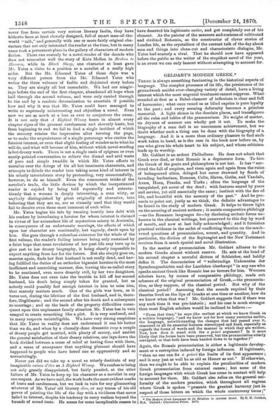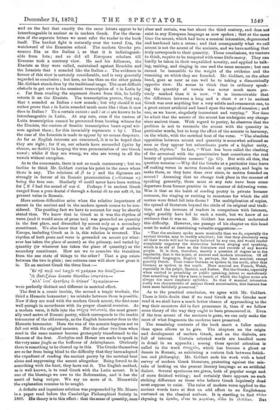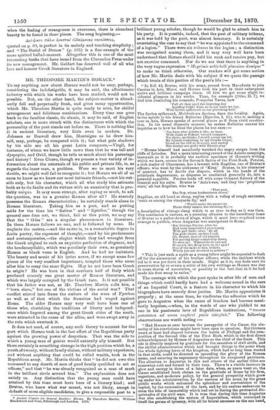GELDART'S MODERN GREEK.*
THERE is always something fascinating in the historical aspects of language. The complex processes of its life, the persistence of its. groundwork amidst ever-changing variety of detail, have a living interest which the most ungenial treatment cannot suppress. What sounded at first as a Babel-clamour of inflexions is clear and full
of harmonies ; what once vexed us as blind caprice is pure loyalty to the past; and every seeming deformity becomes a priceless memorial. A light shines in the desolate places, and transfigures all the rules and tables of the grammarians. No weight of matter, no dryness of manner can wholly put it out. To make the biography of a man dull is no uncommon achievement, but we doubt whether such a thing can be done with the biography of a language. And it is a more than ordinary pleasure to find such work taken in hand, as is the case in the book now before us, by one who gives his whole heart to his subject, and whose criticism leads up to worship.
Mr. Geldart is an ardent Philhellene. He does not admit that Greek ever died, or that Romaic is a degenerate form. To him the Greek of the poets and philosophers is not lost. It has "sur- vived the fall of empires, and risen again and again from the ruins. of beleaguered cities, deluged but never drowned by floods of invading barbarians, Romans, Celts, Slaves, Goths, and Vandals,
Avers, Huns, Franks, and Turks ; often the language of the vanquished, yet never of the dead ; with features seared by years
and service, yet still essentially the same ; instinct with the fire of life, and beautiful with the memory of the past." And he pro- ceeds to point out, justly as we think, the definite advantages to- be found in the study of modem Greek. It helps to throw light on the meaning of ancient authors ; it assists comparative philology —as the Romance languages do—by disclosing archaic forms un- known in the classical writings, but preserved to this day by word of mouth, and now at last fully acknowledged ; and it furnishes practical evidence in the midst of conflicting theories on the much- vexed questions of pronunciation, accent, and quantity. And in. particular, the diction of the Septuagint and the New Testament, receives from it much special and novel illustration.
In the matter of pronunciation Mr. Gelded adheres to the- modern Greeks almost without reserve. He sets at the head of his second chapter a scornful dictum of Schleicher, and boldly defies it. The denunciation of " vollstdndige Unkenntiss der Sprachengeschichte und der Lautlehre iiberhaupt" in any one who.
speaks ancient Greek like Romaic has no terrors for him. Western scholars have, by means of comparative philology, made out schemes of the original pronunciation of Greek,—the pronuncia- tion, as they suppose, of the classical period. But why of the classical period? Assuming that the sounds required by their theories lived on the lips of Greeks at one time or another, how deb we know when that was ? Mr. Geldart suggests that if there was any such time it was pre-historic ; and his case is much stronger than most English scholars would be inclined to believe :—
a From that time," he says (the earliest at which we know Greek as a written language), "and we know not for how many centuries earlier, the language, notwithstanding the changes that had passed over it„ remained in all its essential features stereotyped and fixed, especially as regards the forms of words and the manner in which they are written._ Now, how done it stand with the a priori argument? Is it most likely that the forms have been preserved, but the pronunciation utterly corrupted, or that both have been handed down to us together ?"
Again, the Romaic pronunciation is either a legitimate develop-
ment or a corruption induced by foreign influence. If legitimate, "then no one can fix a priori the limits of its first appearance ;.
and it may just as well be as old as Homer as not." If otherwise, then we ought to be able to explain the peculiarities of modem Greek pronunciation from external causes ; but none of the foreign languages with which Greek has come in contact will help to account for them. Mr. Geldart also relies on the general uni- formity of the modern practice, which throughout all regions where Greek is spoken "presents the greatest harmony just in respect of those letters on which the whole controversy turns ;" • The Modern Greek Language in its Relation Co .eincient Greek. By E. M. Geldart, RA. Oxford: Clarendon Press. 1870.
and on the fact that exactly the the same letters appear to be
interchangeable in ancient as in modern Greek. For the discus- sion of the separate letters we must refer the reader to the book itself. The hardest fight is naturally over the vowel Eta, the watchword of the Erasmian school. The modern Greeks pro- nounce Eta as the Italian i, so that it is indistinguish- able from Iota ; and so did all European scholars till Erasmus took a contrary view. He and his followers, the Etacists as they were called, maintained against Reuchlin and the Iotacists that n sounded like the Italian e. The evidence in favour of this view is certainly considerable, and is very generally regarded as conclusive ; but here, no less than on the other points Mr. Gelded stands firm by the traditional usage. The most difficult obstacle to get over is the constant transcription of 7) in Latin by e. Far from evading the argument drawn from this, he boldly retorts it on the Etacists. The transcription proves, they say, that e sounded as Italian e now sounds ; but why should it not rather prove that e in Latin sounded much more like i than it now does in Italian ? To a certain extent e and i or ei are known to be interchangeable in Latin. At any rate, even if the custom of Latin transcription cannot be prevented from bearing witness for the Etacists, the custom of Semitic transcription bears equal wit- ness against them ; for this invatiably represents 91 by i. Thus the case of the Iotacists is made to appear by no means desperate. As far as English interests are concerned, it is to be hoped that they are right ; for if so, our schools have succeeded (quite by chance, no doubt) in keeping the true pronunciation of one Greek vowel ; whilst if they are wrong, we also are wrong in all the vowels without exception.
As to the consonants, there is not so much controversy ; but we
incline to think Mr. Geldart carries his point in the cases where there is any. The relations of p to 7 and the digamnaa are strongly in favour of its Bomaic pronunciation (=German w) being the true one. Similarly ed could never have been written for t if a had the sound of our d. Perhaps a in ancient Greek ranged from a pure dental d through a dental dh to our soft th, its present value in Romaic.
More serious difficulties arise when the relative importance of accent in the ancient and in the modern speech comes to be con- sidered. The puzzling fact we have to account for may be shortly stated thus. We know that in Greek as it was the rhythm of verse (and it would seem of prose too) was grounded on quantity in the first place, and diversified by accent only as a secondary constituent. We also know that in all the languages of modern Europe, including Greek as it is, this relation is reversed. The rhythm of both prose and verse is grounded on accent (or what- ever has taken the place of accent) as the primary, and varied by quantity (or whatever has taken the place of quantity) as the secondary constituent. How are we to conceive the transition from the one state of things to the other? That a gap exists between the two is plain ; one extreme case will show how great it is. To an ancient Greek the three lines :—
'E r rop1 vtwiXCGX011 711 7poka,scoouaixgeiv-- f3ceEluNney «Notate Ileperiam berepeth-n- ' ;HZ' &pirpo V *rim's" ' A7ceihitcyas+—
were perfectly distinct and different in metrical effect.
The first is a comic iambic, the second a tragic trochaic, the third a Homeric hexameter ; no mistake between them is possible. Now if they are read with the modern Greek accent, the first runs well enough in accordance with its proper classical scansion. As a modern verse, it falls into the erizo; eroXerrx4, the most gener- ally used metre of Romaic poetry, which corresponds to the iambic tetrameter of the old comedy, as the English hexameter does to the Homeric hexameter. Here the run of the accents happens not to fall out with the original measure. But the other two lines when read in the same manner become grotesquely transformed to the likeness of the first. Xschylus and Homer are made to speak in the very same jingle as the buffoons of Aristophanes. Obviously there is something to be cleared up in this. The Greeks themselves are so far from being blind to the difficulty that they have adopted the expedient of reading the ancient poetry by the metrical beat alone and suppressing the accent altogether. Being forced to do something with the knot, they have cut it. The English method, as is well known, is to read Greek with the Latin accent. It is one of the blessings we owe to the Reformation, and it has the merit of being unique. We say no more of it. Meanwhile the explanation remains to be sought.
A definite and ingenious solution was propounded by Mr. Munro in a paper read before the Cambridge Philosophical Society in 1860. His theory is to this effect : that the sense of quantity, once
clear and certain, was lost about the third century, and does not
exist in any European language as now spoken ; that at the same time the accent, which had been a musical intonation, degenerated and hardened into a stress ; and that consequently what we call
accent is not the accent of the ancients, and we have nothing that truly corresponds to their quantity. These conclusions, we venture to think, require to be tempered with some little mercy. They can hardly be taken in their unqualified severity, and applied to talk- ing, reciting, and singing in one and the same measure ; but one cannot be insensible to the weight of the evidence and the reasoning on which they are founded. Mr. Geldart, on the other hand, goes as near as can well be to taking a diametrically opposite view. He seems to think that in ordinary speak- ing the quantity of vowels was never much more pre- cisely marked than it is now. "it is inconceivable that the difference between a long and a short a or in ancient
Greek was ever anything but a very subtle and evanescent one, to a great extent artificial and based upon the usage of scansion ; and one, as we know, singularly inconstant and varying." Nor does he admit that the nature of the accent has undergone any change since ancient times. With regard to poetry, he observes that the problem is not to reconcile the accent with the quantity in
particular words, but to keep the effect of the accents in harmony, on the whole, with the metrical beat of the verse. "The absolute opposition between accent and quantity is somewhat softened as soon as they appear but subordinate parts of a higher unity, namely, rhythm." In fact, "What has been called the clashing of the accentual with the quantitative beat constitutes the real beauty of quantitative measure" (p. 65). But with all this, the question remains :—Why did the Greeks at a particular time leave off making verses in metres founded on quantity, and begin to make them, as they have done ever since, in metres founded on accent ? Assuming that no change took place in the manner of speaking generally, there must at any rate have been some departure from former practice in the manner of delivering verse.
Was it that as the habit of reading poetry in private became common, the singing or reciting in monotone for which the old metres were fitted fell into disuse ? The multiplication of copies, the spread of literature beyond the circle of its original oral tradi- tion, and the increase of readers in comparison with listeners, might possibly have led to such a result, but we know of no evidence that it was so. Mr. Geldart has somewhat underrated this difficulty. However, one passage of his chapter on this head must be noted as containing valuable suggestions :—
" That the ancients spoke more musically than we do, especially the ancient Greeks, may be readily admitted; but that they absolutely sang all their words will not be easily believed by any one, and would render completely nugatory the distinction between singing and speaking, which is as old at least as the literature and records of any known people. It is then, therefore, merely a question of degree as to the regularity, that is the music, of ancient and modern intonation. Of aH cultivated languages, English is, perhaps, the least musical, except possibly Dutch. Then comes German as spoken in the north, after that German as spoken in the south. More musical are French, Welsh, especially in the pulpit, Spanish, and Italian. But the Greeks, especially when excited in preaching or public speaking, intone so melodiously that something very like a tune is heard, of which the higher notes are always the more emphatic syllables. So that if musical intonation really was characteristic of ancient Greek accentuation, this feature has been moat faithfully preserved."
As to the practical conclusion, we agree with Mr. Geldark There is little doubt that if we read Greek as the Greeks now read it we shall have a much better chance of approaching to the way their ancestors did in fact pronounce it, than if we follow some theory of the way they ought to have pronounced it. Even if the true accent of the ancients is gone, we can only make the most of what fragments the moderns have preserved.
The remaining contents of the book merit a fuller notice than space allows us to give. The chapters on the origin
and development of modern Greek, and on the dialects, are full of interest. Certain selected words are handled more in detail in an appendix ; among these special attention is called to the word erorvioli, which has become a ghost or
demon in Romaic, as exhibiting a curious link between fetich- ism and philosophy. Mr. Geldart ends his work with a brief survey of modern Greek literature, protesting against the mis-
take of looking on the present literary language as an artificial dialect. Several specimens are given, both of popular songs ath of more finished writing ; and certainly there appears no such
striking difference as those who believe Greek hopelessly dead must suppose to exist. The rules of modern verse applied to the ancient words have at first an odd effect to an Englishman
nurtured on the classical authors, it is startling to find TXies rhyming to c'epaiov, mlvcu to tcopoiyar, ado to 'avriaarv. Bat
when the feeling of strangeness is overcome, there is abundant beauty to be found in these pieces. The song beginning,—
Api%Para c.cani ipacrral an3ctilhom; retpziorou;,
quoted on p. 60, is perfect in its melody and touching simplicity ; and "The Burial of Demos" (p. 165) is a fine example of the snore spirited ballad-manner. Altogether this is one of the most interesting books that have issued from the Clarendon Press under its new management. Mr. Geldart has deserved well of all who love and honour Greek literature in England.




































 Previous page
Previous page